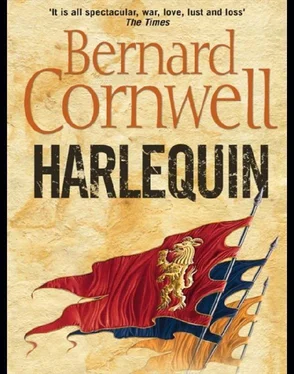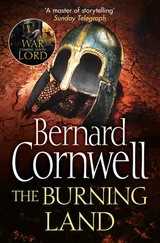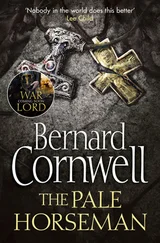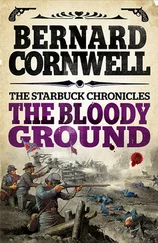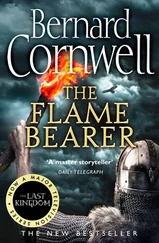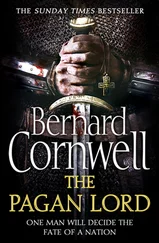A crowd of Caen's menfolk, some armed with nothing more than staves, waited beyond the barbican, promising yet another fight if the barricade was ever overcome. A madness had gripped the Eng-lish army, a madness to attack a bridge that was too well defended. Men went screaming to their deaths and still more followed. The Earl of Warwick was bellowing at them to pull back, but they were deaf to him. Then a great roar of defiance sounded from the riverbank and Thomas stepped out from the porch to see that groups of men were now trying to wade the River Odon. And they were succeeding. It had been a dry summer, the river was low and the falling tide made it lower still, so that at its deepest the water only came up to a man's chest. Scores of men were now plunging into the river. Thomas, dodging two of the Earl's constables, leaped the remnants of the fence and slithered down the bank, which was studded with embedded crossbow quarrels. The place stank of shit, for this was where the city emptied its nightsoil. A dozen Welsh hobelars waded into the river and Thomas joined them, holding his bow high above his head to keep its string dry. The crossbowmen had to stand up from their shelter behind the barge gunwales to shoot down at the attackers in the river, and once they were stand-ing they made easy targets for those archers who had stayed on the city bank.
The current was strong and Thomas could only take short steps. Bolts splashed about him. A man just in front was hit in the throat and was snatched down by the weight of his mail coat to leave nothing but a swirl of bloody water. The ships" gunwales were stuck with white-feathered arrows. A Frenchman was draped over the side of one boat and his body twitched whenever an arrow hit his corpse. Blood trickled from a scupper.
Kill the bastards, kill the bastards," a man muttered next to Thomas, who saw it was one of the Earl of Warwick's constables; finding he could not stop the attack, he had decided to join it. The man was carrying a curved falchion, half sword and half butcher's cleaver.
The wind flattened the smoke from the burning houses, dipping it close to the river and filling the air with scraps of burning straw. Some of those scraps had lodged in the furled sails of two of the ships that were now burning fiercely. Their defenders had scrambled ashore. Other enemy bowmen were retreating from the first mud-streaked English and Welsh soldiers who clambered up the bank between the grounded boats. The air was filled with the quick-fluttering hiss of arrows flying overhead. The island's bells still clamoured. A Frenchman was shouting from the barbican's tower, ordering men to spread along the river and attack the groups of Welsh and English who struggled and slithered in the river mud. Thomas kept wading. The water reached his chest, then began to recede. He fought the clinging mud of the riverbed and ignored the crossbow bolts that drove into the water about him. A cross-bowmen stood up from behind a boat's gunwale and aimed straight at Thomas's chest, but then two arrows struck the man and he fell backwards. Thomas pushed on, climbing now. Then suddenly he was out of the river, and he stumbled up the slick mud into the shelter of the overhanging stern of the closest barge. He could see that men were still fighting at the barricade, but he could also see that the river was now swarming with archers and hobelars who, mud-spattered and soaking, began to haul themselves onto the boats. The remaining defenders had few weapons other than their crossbows, while most of the archers had swords or axes. The fight on the moored boats was one-sided, the slaughter brief and then the disorganized and leaderless mass of attackers surged off the blood-soaked decks and up from the river onto the island. The Earl of Warwick's man-at-arms went ahead of Thomas. He clambered up the steep grassy bank and was immediately hit in the face by a crossbow bolt so that he jerked backwards with a fine mist of blood encircling his helmet. The bolt had driven clean through the bridge of his nose, killing him instantly and leaving him with an offended expression. His falchion landed in the mud at Thomas's feet, so he slung his bow and picked the weapon up. It was surpris-ingly heavy. There was nothing sophisticated about a falchion; it was simply a killing tool with an edge designed to cut deep because of the weight of the broad blade. It was a good weapon for a melee. Will Skeat had once told Thomas how he had seen a Scottish horse decapitated with a single blow of a falchion, and just to see one of the brutal blades was to feel terror in the gut.
The Welsh hobelars were on the barge, finishing off its defenders, then they gave a shout in their strange language and leaped ashore and Thomas followed them, to find himself in a loose rank of crazed attackers who ran towards a row of tall and wealthy houses defended by the men who had escaped from the barges and by the citizens of Caen. The crossbowmen had time to loose one bolt apiece, but they were nervous and most shot wide, and then the attackers were onto them like hounds onto a wounded deer. Thomas wielded the falchion two-handed. A crossbowman tried to defend himself with his bow but the heavy blade sliced through the weapon's stock as if it had been made of ivory, then buried itself in the Frenchman's neck. A spurt of blood jetted over Thomas's head as he wrenched the heavy sword free and kicked the crossbow-man between the legs. A Welshman was grinding a spear blade into a Frenchman's ribs. Thomas stumbled on the man he had struck down, caught his balance and shouted the English war cry. Saint George!“ He swung the blade again, chopping through the fore-arm of a man wielding a club. He was close enough to smell the man's breath and the stink of his clothes. A Frenchman was swinging a sword while another was beating at the Welsh with an iron-studded mace. This was tavern fighting, outlaw fighting, and Thomas was screaming like a fiend. God damn them all. He was spattered with blood as he kicked and clawed and slashed his way down the alley. The air seemed unnaturally thick, moist and warm; it stank of blood. The iron-studded mace missed his head by a finger's breadth and struck the wall instead, and Thomas swung the falchion upwards so it cut into the man's groin. The man yelled out and Thomas kicked the back of the blade to drive it home. Bastard,” he said, kicking the blade again, bastard." A Welshman speared the man and two more leaped his body and, their long hair and beards smeared with blood, lunged their red-bladed spears at the next rank of defenders.
There must have been twenty or more enemy in the alley, and Thomas and his companions were fewer than a dozen, but the French were nervous and the attackers were confident and so they ripped into them with spear and sword and falchion; just hacking and stabbing, slicing and cursing them, killing in a welter of summer hatred. More and more English and Welsh were swarming up from the river, and the sound they made was a keening noise, a howl for blood and a wail of derision for a wealthy enemy. These were the hounds of war that had escaped from their kennels and they were taking this great city that the lords of the army had supposed would hold the English advance for a month.
The defenders in the alley broke and ran. Thomas hacked a man down from behind and wrenched the blade free with a scraping noise of steel on bone. The hobelars kicked in a door, claiming the house beyond as their property. A rush of archers in the Prince of Wales's green and white livery poured down the alley, following Thomas into a long and pretty garden where pear trees grew about neat plots of herbs. Thomas was struck by the incongruity of such a beautiful place under a sky filled with smoke and terrible with screams. The garden had a border of sweet rocket, waliflowers and peonies, and seats under a vine trellis and for an instant it looked like a scrap of heaven, but then the archers trampled the herbs, threw down the grape arbour and ran across the flowers. A group of Frenchmen tried to drive the invaders out of the garden. They approached from the east, from out of the mass of men waiting behind the bridge's barbican. They were led by three mounted men-at-arms, who all wore blue surcoats decorated with yellow stars. They jumped their horses over the low fences and shouted as they raised their long swords ready to strike. The arrows smacked into the horses. Thomas had not unslung his bow, but some of the Prince's archers had arrows on their cords and they aimed at the horses instead of the riders. The arrows bit deep, the horses screamed, reared and fell, and the archers swarmed over the fallen men with axes and swords. Thomas went to the right, heading off the Frenchmen on foot, most of whom seemed to be townsfolk armed with anything from small axes to thatch-hooks to ancient two-handed swords. He cut the falchion through a leather coat, kicked the blade free, swung it so that blood streamed in droplets from the blade, then hacked again. The French wavered, saw more archers coming from the alley and fled back to the barbican.
Читать дальше
Конец ознакомительного отрывка
Купить книгу
